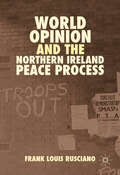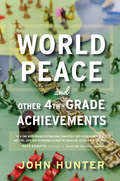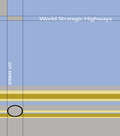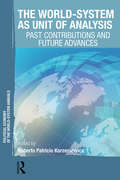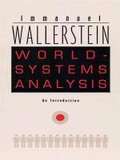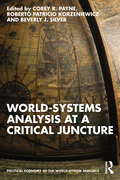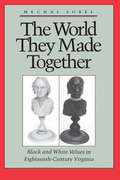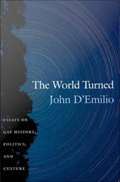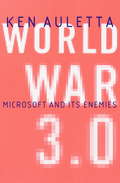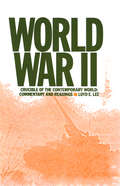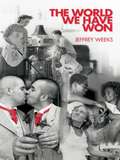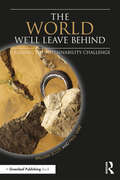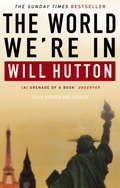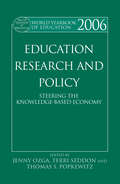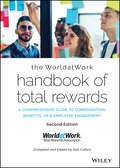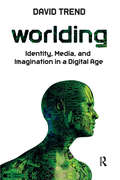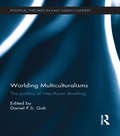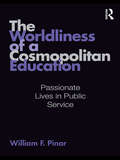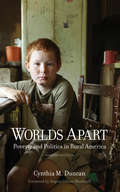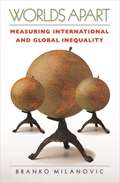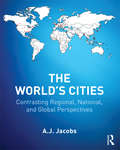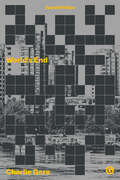- Table View
- List View
World Opinion and the Northern Ireland Peace Process
by Frank Louis RuscianoThis book uniquely combines global opinion theory with the English school of international relations to explain the effects of world opinion on the Northern Ireland peace process. It begins by analyzing the reasons why the civil rights movement imported from the United States ended in the Troubles. It traces how national identity now arises in Northern Ireland as a negotiation between the area's international image and its citizens' national consciousness. Rusciano illustrates how world opinion affects patterns of speech and silencing, and the effect this has on the peace process. He also shows how those negotiating the peace were affected by world opinion. Finally, the volume concludes by describing a possible path toward completing the peace process consistent with world opinion.
World Peace and Other 4th-Grade Achievements
by John Hunter&“His ideas will help anyone who has the courage to understand that a real education must go beyond filling in circles on a standardized test form.&” —Rafe Esquith, New York Times-bestselling author of Teach Like Your Hair&’s on Fire Can playing a game lead to world peace? If it&’s John Hunter&’s World Peace Game, it just might. In Hunter&’s classroom, students take on the roles of presidents, tribal leaders, diplomats, and military commanders. Through battles and negotiations, standoffs and summits, they strive to resolve a sequence of many-layered, interconnected scenarios, from nuclear proliferation to tribal warfare. Now, Hunter shares inspiring stories from over thirty years of teaching the World Peace Game, revealing the principles of successful collaboration that people of any age can apply. He offers not only a forward-thinking report from the frontlines of American education, but also a generous blueprint for a world that bends toward cooperation rather than conflict. In this deeply hopeful book, a visionary educator shows us what the future of education can be. &“The World Peace Game devised by fourth-grade teacher Hunter has spread from a classroom in 1978 to a documentary, a TED Talk, the Pentagon, and now finally a book, in which he describes the ways his students have solved political and ecological crises that still loom large in the world of adults . . . Hunter&’s optimism is infectious.&” —Publishers Weekly &“Inspired, breath-of-fresh-air reading.&” — Kirkus Reviews &“Hunter proves the value of &‘slow teaching&’ in this important, fascinating, highly readable resource for educators and parents alike.&” — Booklist
World Strategic Highways
by Guy ArnoldWorld Strategic Highways provides a detailed examination of approximately 50 of the most important strategic highways in the world. These highways may take the form of roads, railways, rivers and canals, or air and sea routes. They have one thing in common: they are of special significance because, throughout history, they have acted as major trade routes for a number of countries; have military or strategic significance; act to bind a country or countries together; or, in the case of rivers, act as boundaries between two or more countries. They include the Suez and Panama canals, the Rhine and Amazon rivers, the Trans-US Railway, the Khyber Pass and Maputo Corridor, the Silk Road, the Cape sea route and the Pacific sea route. Location maps are provided throughout the book.
The World-System as Unit of Analysis: Past Contributions and Future Advances (Political Economy of the World-System Annuals)
by Roberto Patricio KorzeniewiczWorld-system analyses have recast the study of between- and within-nation country inequality as constituent aspects of a single field of inquiry: the study of inequality and social stratification as processes that always have been global in their very essence. World-system analyses maintain that global social stratification pivots around institutional arrangements that render distributional outcomes as simultaneously “national,” “gendered,” “racialized,” and “global” processes. This book takes stock of some of the enduring theoretical and empirical contributions of a world-system perspective, and identifies promising directions for future inquiry and discussion. Some chapters reassess the scope and methodologies of world-system analysis around several key problems (e.g., the spatial and temporal boundaries of global commodity chains, the construction and challenge of various dimensions of social inequality, systemic and antisystemic social movements). Others take stock of areas in which world-systems are promoting methodological innovation and/or generating useful global data, and identify questions that demand additional methodological and empirical attention for future research. In different ways, this book help us to critically reconsider some of the enduring legacies within a world-system perspective (such as Karl Polanyi’s concept of the “double movement,” or the distinction drawn by Giovanni Arrighi or Immanuel Wallerstein between systemic and antisystemic movements). As argued by many of the authors in this book, a world-historical approach calls for greater sensitivity to the manifold ways in which conceptual boundaries change over time and space. Taking seriously the issue of unit of analysis, this book explores critically productive ways for better understanding global patterns of continuity and change.
World-Systems Analysis: An Introduction
by Immanuel WallersteinIn World-Systems Analysis, Immanuel Wallerstein provides a concise and accessible introduction to the comprehensive approach that he pioneered thirty years ago to understanding the history and development of the modern world. Since Wallerstein first developed world-systems analysis, it has become a widely utilized methodology within the historical social sciences and a common point of reference in discussions of globalization. Now, for the first time in one volume, Wallerstein offers a succinct summary of world-systems analysis and a clear outline of the modern world-system, describing the structures of knowledge upon which it is based, its mechanisms, and its future.Wallerstein explains the defining characteristics of world-systems analysis: its emphasis on world-systems rather than nation-states, on the need to consider historical processes as they unfold over long periods of time, and on combining within a single analytical framework bodies of knowledge usually viewed as distinct from one another--such as history, political science, economics, and sociology. He describes the world-system as a social reality comprised of interconnected nations, firms, households, classes, and identity groups of all kinds. He identifies and highlights the significance of the key moments in the evolution of the modern world-system: the development of a capitalist world-economy in the sixteenth-century, the beginning of two centuries of liberal centrism in the French Revolution of 1789, and the undermining of that centrism in the global revolts of 1968. Intended for general readers, students, and experienced practitioners alike, this book presents a complete overview of world-systems analysis by its original architect.
World-Systems Analysis at a Critical Juncture (Political Economy of the World-System Annuals)
by Corey R. Payne Roberto Patricio Korzeniewicz Beverly J. SilverAs we enter the third decade of the twenty-first century, the world faces extraordinary system-level challenges—from deep inequality and xenophobic nationalism to militarism and neofascism, from the refugee crisis and environmental degradation to upsurges of social unrest and escalating rivalries among powerful states. This book begins from the premise that world-systems analysis can be a powerful tool for the study of these problems, with the potential to overcome the methodological and theoretical limitations of other social science perspectives. The editors argue, moreover, that world-systems analysis can be strengthened by drawing on its holistic methodologies, returning to its Third World roots, and learning from other critical approaches. The authors in this volume not only make important contributions to comparative and historical social science, they also bring a new vigor to the world-systems perspective. Facing critical junctures in both the "state of knowledge" and the "state of the world," this book demonstrates the continued utility of, and future possibilities for, world-systems analysis.
The World They Made Together: Black and White Values in Eighteenth-Century Virginia
by Mechal SobelIn the recent past, enormous creative energy has gone into the study of American slavery, with major explorations of the extent to which African culture affected the culture of black Americans and with an almost totally new assessment of slave culture as Afro-American. Accompanying this new awareness of the African values brought into America, however, is an automatic assumption that white traditions influenced black ones. In this view, although the institution of slaver is seen as important, blacks are not generally treated as actors nor is their "divergent culture" seen as having had a wide-ranging effect on whites. Historians working in this area generally assume two social systems in America, one black and one white, and cultural divergence between slaves and masters. It is the thesis of this book that blacks, Africans, and Afro-Americans, deeply influenced white's perceptions, values, and identity, and that although two world views existed, there was a deep symbiotic relatedness that must be explored if we are to understand either or both of them. This exploration raises many questions and suggests many possibilities and probabilities, but it also establishes how thoroughly whites and blacks intermixed within the system of slavery and how extensive was the resulting cultural interaction.
The World Turned: Essays on Gay History, Politics, and Culture
by John D'EmilioSomething happened in the 1990s, something dramatic and irreversible. A group of people long considered a moral menace and an issue previously deemed unmentionable in public discourse were transformed into a matter of human rights, discussed in every institution of American society. Marriage, the military, parenting, media and the arts, hate violence, electoral politics, public school curricula, human genetics, religion: Name the issue, and the the role of gays and lesbians was a subject of debate. During the 1990s, the world seemed finally to turn and take notice of the gay people in its midst. In The World Turned, distinguished historian and leading gay-rights activist John D'Emilio shows how gay issues moved from the margins to the center of national consciousness during the critical decade of the 1990s. In this collection of essays, D'Emilio brings his historian's eye to bear on these profound changes in American society, culture, and politics. He explores the career of Bayard Rustin, a civil rights leader and pacifist who was openly gay a generation before almost everyone else; the legacy of radical gay and lesbian liberation; the influence of AIDS activist and writer Larry Kramer; the scapegoating of gays and lesbians by the Christian Right; the gay-gene controversy and the debate over whether people are "born gay"; and the explosion of attention focused on queer families. He illuminates the historical roots of contemporary debates over identity politics and explains why the gay community has become, over the last decade, such a visible part of American life.
World War 3.0: Microsoft and Its Enemies
by Ken AulettaThe Internet Revolution, like all great industrial changes, has made the world's elephantine media companies tremble that their competitors--whether small and nimble mice or fellow elephants--will get to new terrain first and seize its commanding heights. In a climate in which fear and insecurity are considered healthy emotions, corporate violence becomes commonplace. In the blink of an eye--or the time it has taken slogans such as "The Internet changes everything" to go from hyperbole to banality--"creative destruction" has wracked the global economy on an epic scale. No one has been more powerful or felt more fear or reacted more violently than Bill Gates and Microsoft. Afraid that any number of competitors might outflank them--whether Netscape or Sony or AOL Time Warner or Sun or AT&T or Linux-based companies that champion the open-source movement or some college student hacking in his dorm room--Microsoft has waged holy war on all foes, leveraging its imposing strengths. In World War 3.0, Ken Auletta chronicles this fierce conflict from the vantage of its most important theater of operations: the devastating second front opened up against Bill Gates's empire by the United States government. The book's narrative spine is United States v. Microsoft, the government's massive civil suit against Microsoft for allegedly stifling competition and innovation on a broad scale. With his superb writerly gifts and extraordinary access to all the principal parties, Ken Auletta crafts this landmark confrontation into a tight, character- and incident-filled courtroom drama featuring the best legal minds of our time, including David Boies and Judge Richard Posner. And with the wisdom gleaned from covering the converging media, software, and communications industries for The New Yorker for the better part of a decade, Auletta uses this pivotal battle to shape a magisterial reckoning with the larger war and the agendas, personalities, and prospects of its many combatants.
World War Two: Crucible of the Contemporary World - Commentary and Readings (Greenwood Press Guides To Historic Events Of The Twentieth Century Ser.greenwood Press Guides To Historic Events Of The Twentieth Century Series)
by Lily Xiao LeeThis anthology contains 16 readings by English-language scholars that deal with military, political, diplomatic, and social aspects of World War II and its consequences for the contemporary world. The readings are grouped around seven major topics and each topic is prefaced with a substantial commentary by Professor Lee that places it in historical context. The readings consist of complete articles or integral chapters rather than abridged selections so that each author's argument can be read in its original form. The authors are: Gerhard L. Weinberg, Akira Ireye, Jan Thomasz Gross, Betram M. Gordon, Michael R. Marrus, Hugh Tinker, Roy Fraser Holland, Lloyd E. Eastman, Roberta Wohlstetter, Williamson Murray, Sheila Fitzpatrick, D'Ann Campbell, Robert M. Hathaway, Melvyn P. Leffler, A.J. Levine, and Lawrence Freedman.
The World We Have Lost: Further Explored
by Peter LaslettHistory of the population of England, comparing 16th and 17th century to the 20th century. Relies on records to discover how most people really lived back in the day.
The World We Have Won: The Remaking of Erotic and Intimate Life
by Jeffrey WeeksThe World We Have Won is a major study of transformations in erotic and intimate life since 1945. We are living in a world of transition, in the midst of a long, unfinished but profound revolution that has transformed the possibilities of living out our sexual diversities. This book provides a balance sheet of the changes that have transformed our ways of being, from welfarism to the pill, women's and gay liberation, from globalization, consumerism and individualization to new forms of intimacy, from friends as family to same sex marriage. Some respond to these challenges with a deep cultural pessimism or moral conservatism. It rejects such views and argues that this is a world we are increasingly making for ourselves, part of the long process of democratization of everyday life. Unless we grasp this we cannot understand, not only the problems and anxieties, but the opportunities and hopes in this world we have won.
The World We'll Leave Behind: Grasping the Sustainability Challenge
by William Scott Paul VareIt is now clear that human activity has influenced how the biosphere supports life on Earth, and given rise to a set of connected environmental and social problems. In response to the challenge that these problems present, a series of international conferences and summits led to discussions of sustainable development and the core dilemma of our time: How can we all live well, now and in the future, without compromising the ability of the planet to enable us all to live well? This book identifies the main issues and challenges we now face; it explains the ideas that underpin them and their interconnection, and discusses a range of strategies through which they might be addressed and possibly resolved. These cover things that governments might do, what businesses and large organisations can contribute, and the scope for individuals, families and communities to get involved. This book is for everyone who cares about such challenges, and wants to know more about them.
The World We're In
by Will HuttonTHE STATE WE'RE IN, Will Hutton's explosive analysis of British society, was the biggest selling politico-economic work since the Second World War. Now, as the world realigns itself in the wake of September 11, Hutton turns his attention to the global picture, and the ways in which the new world should be ordered.To understand the global economy, Hutton argues, one must first understand the United States where, over the past 30 years, the forces of conservatism have achieved such supremacy as to reduce liberalism to a term of abuse. The results have been dire: America is a weaker, fragmented society, and its economic strenths are oversold and misunderstood.But Britain and Europe are different: our attitudes towards property, equality, social solidarity and the public realm are strikingly distinct from Amerrica's current conservative leanings. Europe should not be afraid to stand up against the American version of globalisation, and champion the cause of a reinvigorated international society - taking over the mantle now abandoned by the US.
The World We're In
by Will HuttonA wake-up call to Britain, and the global economyTHE STATE WE'RE IN, Will Hutton's explosive analysis of British society, was the biggest selling politico-economic work since the Second World War. Now, as the world realigns itself in the wake of September 11, Hutton turns his attention to the global picture, and the ways in which the new world should be ordered.To understand the global economy, Hutton argues, one must first understand the United States where, over the past 30 years, the forces of conservatism have achieved such supremacy as to reduce liberalism to a term of abuse. The results have been dire: America is a weaker, fragmented society, and its economic strenths are oversold and misunderstood.But Britain and Europe are different: our attitudes towards property, equality, social solidarity and the public realm are strikingly distinct from Amerrica's current conservative leanings. Europe should not be afraid to stand up against the American version of globalisation, and champion the cause of a reinvigorated international society - taking over the mantle now abandoned by the US.
World Yearbook of Education 2006: Education, Research and Policy: Steering the Knowledge-Based Economy (World Yearbook of Education)
by Thomas S. Popkewitz Terri SeddonThis volume considers the ways in which educational research is being shaped by policy across the globe. Policy effects on research are increasingly influential, as policies in and beyond education drive the formation of a knowledge-based economy by supporting increased international competitiveness through more effective, evidence-based interventions in schooling, education and training systems. What consequences does this increased steering have for research in education? How do transnational agencies make their influence felt on educational research? How do national systems and traditions of educational research - and relations with policy - respond to these new pressures? What effects does it have on the quality of research and on the freedom of researchers to pursue their own agendas? The 2006 volume of the World Yearbook of Education explores these issues, focusing on three key themes: globalising policy and research in education steering education research in national contexts global-local politics of education research. The 2006 volume has a truly global reach, incorporating transnational policy perspectives from the OECD and the European Commission, alongside national cases from across the world in contrasting contexts that include North and South America, Canada, France, Singapore, China, Russia and New Zealand. The range of contributions reflect how pervasive these developments are, how much is new in this situation and to what extent evidence-based policy pressures on research in education build on past relationships between education and policy. This book considers the impact of the steering processes on the work and identities of individual researchers and considers how research can be organised to play a more active role in the politics of the knowledge economy and learning society.
The WorldatWork Handbook of Total Rewards: A Comprehensive Guide to Compensation, Benefits, HR & Employee Engagement
by WorldatWorkEquip yourself to manage, motivate, compensate, and reward everyone in this workplace revolution The future of work is here. From the shift to Millennials and Gen Z in the workforce to the advent of the Fourth Industrial Revolution and the Gig Economy, the world of work and rewards has significantly changed since the initial WorldatWork Handbook was published. Human resources and total rewards professionals need tools to equip them to manage a changing workforce. This completely revised second edition addresses the challenging and disruptive issues facing employers today and tomorrow. The WorldatWork Handbook of Total Rewards is the definitive authority on compensation and rewards from the leading global nonprofit organizations for professionals who are engaged in the critically important practice of total rewards. This book is a go-to resource for all business professionals and leaders who reward and create productive, committed and inspired workforces worldwide. Readers will learn the basics of rewards, along with a deep dive and high-level view of how rewards programs enable organizations to deliver on their brand promises and perform at their optimal level. Gain a thorough understanding of compensation and benefits, along with employee well-being, development, and recognition, all updated to address the realities of today’s workplace. Understand why the Millennial and Gen Z workforce requires a different value proposition, and how to meet their needs. Discover the tools and techniques you need to help you reskill and become a highly valued workforce contributor and leader in the digital era. Learn how to attract, retain, and engage talent by building a healthy workplace culture and employing unique incentives that drive high performance and loyalty. Technical enough for specialists but broad in scope for managers and HR generalists, this well-rounded resource belongs on the desk of anyone interested in organizational effectiveness. An indispensable tool for understanding and implementing the total rewards concept, The WorldatWork Handbook of Total Rewards, Second Edition is the key to designing programs and practices that ensure employee engagement and organizational success.
Worlding: Identity, Media, and Imagination in a Digital Age
by David TrendWorlding brings ideas about "virtual" places and societies together with perceptions about the "real" world in an era of mounting global uncertainty. As mass media and the Internet consume ever-increasing portions of our lives, are we becoming disengaged from face-to-face human interaction and real-world concerns? Or is the virtual world actually bringing people closer together and making them more involved with social issues? Worlding argues that the "virtual" and the "real" are profoundly interconnected, often in ways we don't fully appreciate. Drawing on sociology, cultural studies, philosophy, media analysis, and technology studies, Worlding makes the argument that virtual experience and social networking can be vital links to utopian visions and an appreciation of the world's diversity.
Worlding Multiculturalisms: The Politics of Inter-Asian Dwelling (Political Theories in East Asian Context)
by Daniel P. GohWorlding multiculturalisms are practices that infuse our arbitrary cultural lives with new things from other cultures in poetic ways to enable us to dwell and be at home with the complexity of the world. In the context of the crisis of multiculturalism in the West and the growing obsolescence of state-based multiculturalism in the postcolonial world, this book offers examples of new practices of worlding multiculturalisms that go beyond issues of immigration, integration and identity. Contrasting Western and Asian notions of multiculturalism, this book does not focus on state issues, but rather, highlights manifestations of cultural exchange. The chapters draw on cultural studies approaches to document instances of worlding multiculturalisms that bring Asian cultures into conflict, dialogue and settlement with each other. Instances include an Asian American return novel set in Penang, the cultural productions and street performances of democracy marches in Malaysia, the campaigns to reclaim public spaces and citizenship rights by migrant domestic workers in Hong Kong, the imaginary vistas opened up by Japanese popular culture consumed throughout Asia, the localisations of casino complexes in Macau and a shopping mall in Seoul, and an old municipal cemetery being defended from urban redevelopment in Singapore. Rather than merely globalizing forms of political diversity, these are instances with the potential to transform social relations and the very terms of cultural exchange. Worlding Multiculturalisms offers a truly interdisciplinary examination of multiculturalism in action. As such, it will appeal to students and scholars of cultural studies, Asian studies, Asian culture and society, cultural anthropology and sociology and political sociology.
The Worldliness of a Cosmopolitan Education: Passionate Lives in Public Service (Studies in Curriculum Theory Series)
by William PinarPinar positions himself against three pressing problems of the profession: the crime of collectivism that identity politics commits, the devaluation of academic knowledge by the programmatic preoccupations of teacher education, and the effacement of educational experience by standardized testing. A cosmopolitan curriculum, Pinar argues, juxtaposes the abstract and the concrete, the collective and the individual: history and biography, politics and art, public service and private passion. Such a curriculum provides passages between the subjective and the social, and in so doing, engenders that worldliness a cosmopolitan education invites. Such worldliness is vividly discernible in the lives of three heroic individuals: Jane Addams (1860-1935), Laura Bragg (1881-1978), and Pier Paolo Pasolini (1922-1975). What these disparate individuals demonstrate is the centrality of subjectivity in the cultivation of cosmopolitanism. Subjectivity takes form in the world, and the world is itself reconstructed by subjectivity’s engagement with it. In this intriguing, thought-provoking, and nuanced work, Pinar outlines a cosmopolitan curriculum focused on passionate lives in public service, providing one set of answers to how the field accepts and attends to the inextricably interwoven relations among intellectual rigor, scholarly erudition, and intense but variegated engagement with the world.
The Worldly Philosophers: The Lives, Times and Ideas of the Great Economic Thinkers
by Robert HeilbronerAdam Smith, Malthus, David Ricardo, Karl Marx, Thorstein Veblen, John Maynard Keynes, and more...
Worlds Apart
by Angela Blackwell Cynthia M. DuncanFirst published in 1999, Worlds Apart examined the nature of poverty through the stories of real people in three remote rural areas of the United States: New England, Appalachia, and the Mississippi Delta. In this new edition, Duncan returns to her original research, interviewing some of the same people as well as some new key informants. Duncan provides powerful new insights into the dynamics of poverty, politics, and community change. "Duncan, through in-depth investigation and interviews, concludes that only a strong civic culture, a sense among citizens of community and the need to serve that community, can truly address poverty. . . . Moving and troubling. Duncan has created a remarkable study of the persistent patterns of poverty and power. "#151;Kirkus Reviews "The descriptions of rural poverty in Worlds Apart are interesting and read almost like a novel. "#151;Choice
Worlds Apart: Measuring International and Global Inequality
by Branko MilanovicWe are used to thinking about inequality within countries--about rich Americans versus poor Americans, for instance. But what about inequality between all citizens of the world? Worlds Apart addresses just how to measure global inequality among individuals, and shows that inequality is shaped by complex forces often working in different directions. Branko Milanovic, a top World Bank economist, analyzes income distribution worldwide using, for the first time, household survey data from more than 100 countries. He evenhandedly explains the main approaches to the problem, offers a more accurate way of measuring inequality among individuals, and discusses the relevant policies of first-world countries and nongovernmental organizations. Inequality has increased between nations over the last half century (richer countries have generally grown faster than poorer countries). And yet the two most populous nations, China and India, have also grown fast. But over the past two decades inequality within countries has increased. As complex as reconciling these three data trends may be, it is clear: the inequality between the world's individuals is staggering. At the turn of the twenty-first century, the richest 5 percent of people receive one-third of total global income, as much as the poorest 80 percent. While a few poor countries are catching up with the rich world, the differences between the richest and poorest individuals around the globe are huge and likely growing.
The World's Cities: Contrasting Regional, National, and Global Perspectives (The Metropolis and Modern Life)
by A. J. JacobsThe World’s Cities offers instructors and students in higher education an accessible introduction to the three major perspectives influencing city-regions worldwide: City-Regions in a World System; Nested City-Regions; and The City-Region as the Engine of Economic Activity/Growth. The book provides students with helpful essays on each perspective, case studies to illustrate each major viewpoint, and discussion questions following each reading. The World’s Cities concludes with an original essay by the editor that helps students understand how an analysis incorporating a combination of theoretical perspectives and factors can provide a richer appreciation of the world’s city dynamics.
World's End (Spatial Politics)
by Charlie GereA memoir and cultural history the World&’s End, a West London area once home to bohemian artists and punk rock and now an outpost of neoliberalism.Charlie Gere&’s account of growing up in the World&’s End area of West London during the Cold War combines local history, cultural history, memoir, and a strong sense of the apocalyptic. Once a rundown part of Chelsea at the wrong end of the King&’s Road, the World&’s End has long been a place for bohemian writers and artists, including Turner, Whistler, Beckett, Bacon, and Bacon&’s muse Henrietta Moraes, all of whom evinced an appropriate apocalyptic sensibility. After World War II, in which the area suffered severe bombing, it became a center of the counterculture that emerged from what Jeff Nuttall called &“Bomb Culture,&” formed by the threat of nuclear annihilation. The famous boutique Granny Takes a Trip opened there in 1966, joined later on by Hung On You, Puss Weber&’s Flying Dragon Tea Room, and the commune Gandalf&’s Garden. The area also featured trepanning aristocrats and pet lions, among other eccentricities. In the 1970s, the World&’s End was the center of punk rock. Gere&’s parents arrived as part of a wave of gentrification, and Gere, born and brought up there, witnessed its social and cultural evolution. As an adolescent, he was traumatized by the prospect of nuclear war. He has lived long enough to see the World&’s End now bearing the marks of out-of-control neoliberalism and its grotesque accompanying inequality. But this too shall pass as worlds end.
